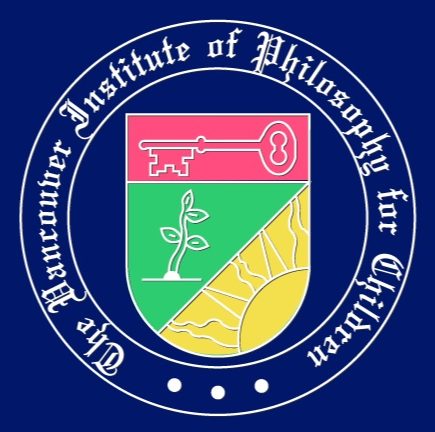
Constitution of the Vancouver Institute of Philosophy for Children (VIP4C)
1) The name of the society is the Vancouver Institute of Philosophy for Children (hereinafter referred to as “the Society”).
2) The purposes of the Society are:
- To help build flourishing communities by empowering children with the thinking skills to be the best that they can be.
- The development of a university curriculum on “Philosophy for Children” (P4C)—an education initiative recognized by UNESCO.
- To integrate this dialogical method into the teacher education programs in BC.
- To contribute to the creation of a “National Body of Philosophy for Children” in Canada.
- To help organize school projects and have entire schools use this dialogue method for teaching and conflict resolution.
- To organize local and international conferences.
- To offer workshops, philosophical cafes, summer institutes, and Philosopher in Residence Programs.
- To create P4C summer camps for BC youngsters.
On August 13, 2023, the Vancouver Institute of Philosophy for Children was incorporated as the Vancouver Institute of Philosophy for Children Society under the Society Act of British Columbia (S-0062126). The Vancouver Institute of Philosophy for Children’s governance process is regulated by the BC Societies Act and our constitution and bylaws that have been developed over the years.












Bylaws of the Vancouver Institute of Philosophy for Children or VIP4C (the “Society”)
Part 1 – Definitions and Interpretation
Definitions
1.1 In these Bylaws:
“Act” means the Societies Act of British Columbia as amended from time to time;
“Board” means the directors of the Society;
“Bylaws” means these Bylaws as altered from time to time.
“Directors” means Directors of the Society for the time being, as elected by the members at the Annual General Meeting or appointed pursuant to these bylaws;
“Members” means members of the Society in good standing pursuant to these bylaws;
Definitions in Act apply
1.2 The definitions in the Act apply to these Bylaws.
Conflict with Act or regulations
1.3 If there is a conflict between these Bylaws and the Act or the regulations under the Act, the Act or the regulations, as the case may be, prevail.
Part 2 – Members
Application for membership
2.1 A person may apply to the Board for membership in the Society, and the person becomes a member on the Board’s acceptance of the application.
Duties of members
2.2 Every member must uphold the constitution of the Society and must comply with these Bylaws.
Amount of membership dues
2.3 The amount of the annual membership dues, if any, must be determined by the Board.
Member not in good standing
2.4 A member is not in good standing if the member fails to pay the member’s annual membership dues, if any, and the member is not in good standing for so long as those dues remain unpaid.
Members not in good standing may not vote
2.5 A voting member who is not in good standing
(a) may not vote at a general meeting, and
(b) is deemed not to be a voting member for the purpose of consenting to a resolution of the voting members.
Termination of membership if member not in good standing
2.6 A person’s membership in the Society is terminated if the person is not in good standing for six consecutive months.
Part 3 – General Meetings of Members
Time and place of general meeting
3.1. General meetings of the Society shall be held at the time and place determined by the directors in accordance with the Act.
3.2. Every general meeting, other than an annual general meeting, is an extraordinary general meeting.
3.3. The Directors may, when they see fit, convene an extraordinary general meeting.
3.4. Notice of a general meeting shall specify the place, day and hour of the meeting and, in the case of special business, the general nature of that business.
3.5. The accidental omission to give notice of a meeting to, or the non-receipt of a notice by, any of the members entitled to receive notice does not invalidate proceedings at the meeting.
3.6. The first annual general meeting of the Society shall be held not more than fifteen (15) months after the date of incorporation, and after that, an annual general meeting shall be held at least once in every calendar year and not more than fifteen (15) months after the holding of the last preceding annual general meeting.
3.7. All members who have been members in good standing for a minimum 60-day period immediately prior to the date of any annual general meeting or extraordinary general meeting are entitled to vote at that meeting.
Part 4 – Directors
Number of directors on the Board
4.1 The Society must have no fewer than 3 and no more than 11 directors.
Election or appointment of directors
4.2 At each annual general meeting, the voting members entitled to vote for the election or appointment of directors must elect or appoint the Board.
Directors may fill casual vacancies on the Board
4.3 The Board may, at any time, appoint a member as a director to fill a vacancy that arises on the Board as a result of the resignation, death or incapacity of a director during the director’s term of office.
Term of appointment of director filling a casual vacancy
4.4 A director appointed by the Board to fill a vacancy ceases to be a director at the end of the unexpired portion of the term of office of the individual whose departure from office created the vacancy.
Part 5 – Directors’ Meetings
Calling directors’ meeting
5.1 A directors’ meeting may be called by the president or by any 2 other directors.
Notice of directors’ meeting
5.2 At least 2 days’ notice of a directors’ meeting must be given unless all the directors agree to a shorter notice period.
Proceedings valid despite omission to give notice
5.3 The accidental omission to give notice of a directors’ meeting to a director or the non-receipt of a notice by a director, does not invalidate proceedings at the meeting.
Conduct of directors’ meetings
5.4 The directors may regulate their meetings and proceedings as they think fit.
Quorum of directors
5.5 The quorum for the transaction of business at a directors’ meeting is a majority of the directors.
Part 6 – Board Positions
Election or appointment to Board positions
6.1 Directors must be elected or appointed to the following Board positions, and a director, other than the president, may hold more than one position:
(a) president;
(b) vice-president;
(c) secretary;
(d) treasurer.
Directors at large
6.2 Directors who are elected or appointed to positions on the Board in addition to the positions described in these Bylaws are elected or appointed as directors at large.
Role of president
6.3 The president is the chair of the Board and is responsible for supervising the other directors in the execution of their duties.
Role of vice-president
6.4 The vice-president is the vice-chair of the Board and is responsible for carrying out the duties of the president if the president is unable to act.
Role of secretary
6.5 The secretary is responsible for doing, or making the necessary arrangements for, the following:
(a) issuing notices of general meetings and directors’ meetings;
(b) taking minutes of general meetings and directors’ meetings;
(c) keeping the records of the Society in accordance with the Act;
(d) conducting the correspondence of the Board;
(e) filing the annual report of the Society and making any other filings with the registrar under the Act.
Absence of secretary from meeting
6.6 In the absence of the secretary from a meeting, the Board must appoint another individual to act as secretary at the meeting.
Role of treasurer
6.7 The treasurer is responsible for doing, or making the necessary arrangements for, the following:
(a) receiving and banking monies collected from the members or other sources;
(b) keeping accounting records in respect of the Society’s financial transactions;
(c) preparing the Society’s financial statements;
(d) making the Society’s filings respecting taxes.
Part 7 – Remuneration of Directors and Signing Authority
Remuneration of directors
7.1 These Bylaws do not permit the Society to pay to a director remuneration for being a director, but the Society may, subject to the Act, pay remuneration to a director for services provided by the director to the Society in another capacity.
Signing authority
7.2 A contract or other record to be signed by the Society must be signed on behalf of the Society
(a) by the president, together with one other director,
(b) if the president is unable to provide a signature, by the vice-president together with one other director,
(c) if the president and vice-president are both unable to provide signatures, by any 2 other directors, or
(d) in any case, by one or more individuals authorized by the Board to sign the record on behalf of the Society.
Part 8 – Grants and Contributions
8.1. The making of grants and contributions and otherwise rendering financial assistance shall be within the power of the membership and the Board of Directors.
8.2. The Board of Directors shall require that all requests for grants or contributions be made in writing, stating amount requested and the use for which the funds will be put and whether their use is consistent with the purposes of the Society.
8.3. The Board of Directors shall require that grantees furnish periodic accountings to show that disbursed funds have been expended for the purposes that are approved.
8.4. All grantees shall enter into an agreement with the Society on such terms and conditions, which the Board of Directors shall determine and ensure proper use of the funds.

